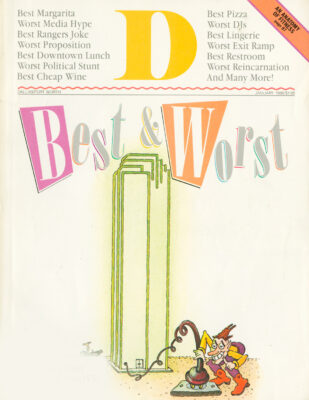If you didn’t make it to the Amon Carter Museum in Fort Worth for the Richard Av-edon exhibit, “In the American West,” you missed a moving but deeply disturbing experience. As art or examples of photographic technique I suppose the pictures are great, though I know little about photography. But as social commentary, as a mirror for our society, they amount to an indictment in black and white.
An image transformed into a photograph, Avedon says, “is no longer a faet but an opinion.” If so. Avedon’s opinion of working life in the American West is frighteningly clear: It’s an all-consuming hell. His photographs of coal miners, slaughterhouse men, ranch hands, oil field workers and other laboring people form an unforgettable tableau of men crushed by grueling work, virtually eaten alive by their jobs.
Judging only from these photographs, Avedon never met a happy worker in his travels through the West. Blackened by coal dust and oil, stained with gypsum plaster, burned and cracked by sun and wind, their faces speak of misery and fatigue. These faces and these gnarled hands remind us that, like it or not, work defines us. We are what we do-and these men do the back-breaking, filthy jobs that heat condominiums and put the fajitas on the tables of trendy new restaurants. One particularly symbolic photo, taken in a slaughterhouse, shows a man holding part of an animal carcass, his blood-darkened arm so entwined with the beast’s entrails that it is hard to see where the man ends and the animal begins-or how the worker can be separated from his work. And perhaps that is the ominous message of these pictures. The work some people must do overwhelms them, shapes them to its purposes and strip-mines away the elements of their humanity not needed by the work.
“It’s depressing,” said one well-dressed woman as she peered at a group of grimy coal miners. “He ought to show the happy things. Nobody’s smiling.” No, Avedon’s workers are not smiling. Some seem to lack the energy to bring up a smile. They’re tired, covered with mud and insect bites and blood, and tomorrow they will be doing it; They’ve never heard of Richard Avedon, don’t have much time for Art and the finer things. After the admiring and puzzled crowds are gone, these anonymous men will still have their dirty, dangerous work.
It’s a good thing for the capitalist system that Karl Marx never met Richard Avedon. Had Marx’s rhetoric of the oppressed worker been married to Avedon’s haunting photographs . . . But what are the alternatives? The socialist countries not only failed to produce the promised “workers’ paradise,” they can’t even feed their own people-and they’ve extinguished freedom in the bargain. Still, the undeniable failure of the socialist system should not blind us to the human cost of our own way.
Let’s hope, along with Utopians like John Naisbitt (Megatrends, Re-Inventing the Corporation), for a day when all work will be self-actualizing, people-oriented and fun. Until that perfect day, however, let’s take pause when we hear Naisbitt or one of his disciples waxing ecstatic over our supposed shift from an industrial society to an “information society.” and the liberations that change will bring. For every entrepreneur or computer worker, there are still hundreds of Avedon’s people out there doing the dirty work. We shouldn’t sentimentalize these workers or pretend that they are somehow wiser or nobler than paper-pushers and data processors, but let us face the blunt facts: Even in Utopia, someone is going to have to take out the garbage.
The traditional chamber of commerce platitudes about the dignity of work ring pretty hollow when we consider what a dehumanizing experience work is for so many. Small wonder that public opinion polls and books like Studs Terkel’s Working reveal that vast numbers of people, perhaps a majority, loathe their jobs and endure them only for financial survival. Small wonder that many opt out altogether, viewing the world of work as a trap for suckers.
A few days after seeing the Avedon photographs. I ran into an acquaintance who happens to be a bookie. Bob, not his real name, is in his early 40s and has spent exactly one year of his adult life at a “real” job, that with the Federal Housing Administration. One taste of the workaday world convinced Bob that straight 9-to-5 reality was not for him. Bookmaking has supported him comfortably for more than a decade. He always seems happy, quick with a joke or a tall tale. The only flaw in his personality is a slightly condescending attitude toward people who work at ordinary jobs. “Haven’t you guys figured it out yet?” his whole manner seems to say. The fact that his profession is illegal bothers him not at all; in fact, he considers himself not just a businessman but a humanitarian, helping people be happier than they would be-for a price.
“A lot of guys work at some job they don’t like,” he once said. “They go home, but they don’t really want to be there and their wives don’t really want them to be there. They don’t have much going on, but come football season, they’re alive. Betting gives them something to look forward to every week.”
Not surprisingly, most of Bob’s customers lose more than they win-and every time they lose he wins, plus a 10 percent “vigor-ish” for handling charges. Each week he meets dozens of losers and a few winners at a local bar where they settle accounts. Most weeks are good for him. Some are great. After the Washington-Dallas rematch in November (a game every armchair expert bet the Cowboys would not win-but they did), thousands flowed into his pockets. His overhead costs? Two telephones and the betting sheets he mails to customers each week.
Moralists view Bob as a parasite on honest working people, and I suppose he is, though he’s a very popular parasite whose hosts seek him out. He’s never going back to the real world, he says.
As different as they seem, the coal miner and the bookie are two ends of the same spectrum. One is possessed by his work, reduced to a cog in the wheels of commerce. Though his work is vital to society, he gets little reward for his long hours of drudgery. The other has broken free of the system; he sets his own hours and makes more by fielding a few phone calls than that coal miner will make in a year. The system brands him a criminal but is really unable to stop him. Too many people want the chance for easy money that he represents.
Nobody will ever enshrine Bob in a museum, but can we really tell him that he’d be happier and more useful loading 50-pound bags of gypsum powder in the blazing sun? Bob may not be much of an argument for the glories of the work ethic, but neither are Avedon’s unsmiling laborers.
Get our weekly recap
Brings new meaning to the phrase Sunday Funday. No spam, ever.
Related Articles

Sponsored Content
Experience the Softer Side of Car Buying
Taking care of Texas, one family at a time.

Restaurants & Bars
A Retired English Teacher Is Redefining Duncanville Nightlife
LoLecia Day, a recently retired AP English teacher, took the leap from the classroom to life behind the bar, opening her own spot, Day Drink Lounge.
By Deah Berry Mitchell



